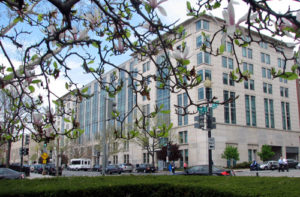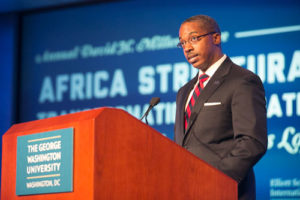2017 Graduate Education | International Affairs
THIS GUIDE IS NO LONGER ACTIVE. For the current FP Guide, click here.
The George Washington University, Elliott School of International Affairs
 “International affairs programs attract a special breed of students. They care about the state of the world and want to fight the world’s toughest problems,” says Reuben E. Brigety II, dean of the Elliott School of International Affairs at The George Washington University (GWU). Located just steps away from the White House, the Elliott School prepares nearly 700 students each year for meaningful careers in international affairs.
“International affairs programs attract a special breed of students. They care about the state of the world and want to fight the world’s toughest problems,” says Reuben E. Brigety II, dean of the Elliott School of International Affairs at The George Washington University (GWU). Located just steps away from the White House, the Elliott School prepares nearly 700 students each year for meaningful careers in international affairs.

Before joining the Elliott School as dean in 2016, Reuben E. Brigety II served as U.S. representative to the African Union and permanent U.S. representative to the UN Economic Commission for Africa. His experience spans a variety of sectors, including the U.S. Department of State, the Center for American Progress, the Pentagon, and more. As a longtime practitioner, he strongly values the Elliott School’s multidisciplinary approach and its philosophy of international affairs as an applied discipline.
“We believe that to solve many of the world’s problems, we need to build leaders for the world,” says Brigety, who sees ethics as a core component of strong leadership. “At the Elliott School, we are committed to excellence in teaching and to rigorous teaching of ethics.”
An emphasis on ethics in the Elliott School’s curriculum includes plans for a future summer Academy for Leadership, Ethics, and Practice. It’s part of the goal of ensuring that Elliott School graduates are equipped to address ethical and leadership challenges in addition to having the other practical skills they will need for workplace effectiveness and career success.
Thirty-eight percent of graduates from the Elliott School’s class of 2016 are working for government or multilateral organizations. Another 28 percent are employed by nonprofit organizations, and 27 percent are in the private sector.
Private sector employers include consulting firms, government contractors, financial services, and others. “International affairs can be an incredibly useful degree in the private sector,” says Brigety.
The Elliott School offers an unusually broad curriculum, with more than a dozen different master’s degrees that combine rigorous coursework with professional training. In addition to programs in development, trade and investment policy, security policy and more, the school also offers programs covering every region of the world: Asian Studies, European and Eurasian Studies, Latin American and Hemispheric Studies, Middle East Studies, and a new African Studies program set to begin in fall 2017.
 All programs have an applied orientation, facilitated by the school’s location in the heart of Washington, D.C. “We have the best location of any international affairs school on the planet,” says Brigety. Master’s degree classes at the Elliott School start at 4 p.m. or later to allow students to maintain a job or internship while also studying full-time, and many students do so.
All programs have an applied orientation, facilitated by the school’s location in the heart of Washington, D.C. “We have the best location of any international affairs school on the planet,” says Brigety. Master’s degree classes at the Elliott School start at 4 p.m. or later to allow students to maintain a job or internship while also studying full-time, and many students do so.
With full-time work and study, students often have extremely busy schedules, and Brigety says that’s part of learning the time-management skills their careers will demand. “Almost any job their studies lead to is incredibly demanding, so part of the master’s degree program experience is learning how to manage the demands,” he says.
Master’s Degrees offered: See Program Directory
Receive School Information: See Request Info
Contents
- 2017 Graduate Education | International Affairs
- Association of Professional Schools of International Affairs (APSIA)
- The George Washington University, Elliott School of International Affairs
- New York University School of Professional Studies (NYUSPS), Center for Global Affairs (CGA)
- UC San Diego, School of Global Policy and Strategy (GPS)
- Georgetown University, Walsh School of Foreign Service (SFS)
- The Fletcher School of Law and Diplomacy at Tufts University
- Yale University, Jackson Institute for Global Affairs
- Seton Hall University, School of Diplomacy and International Relations
- Penn State School of International Affairs
- The New School, Graduate Program in International Affairs
- Boston University, Frederick S. Pardee School of Global Studies
- University of Minnesota, Humphrey School of Public Affairs
- University of Denver, Josef Korbel School of International Studies
- Johns Hopkins University, School of Advanced International Studies (SAIS)
- SOAS University of London
- University of Kent, Brussels School of International Studies (BSIS)
- Fordham University, Graduate Program in International Political Economy and Development (IPED)
- The University of Texas at Austin, Lyndon B. Johnson School of Public Affairs
- Syracuse University, Maxwell School of Citizenship and Public Affairs

